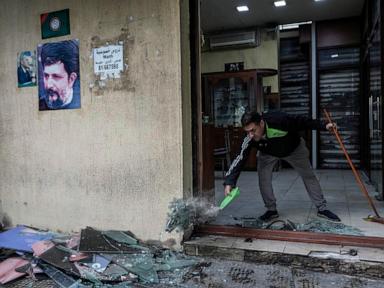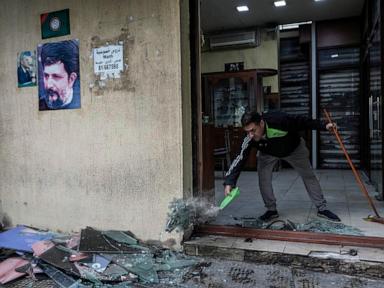Netanyahu tells US envoys that Israel must enforce security in any Lebanon cease-fire deal

Israel’s prime minister told top Biden administration officials on Thursday that the main points of any cease-fire agreement with Hezbollah must provide Israel the ability to counter security threats from Lebanon and return Israeli citizens to communities in the north of the country.
Brett McGurk and Amos Hochstein, senior White House officials focused on the Middle East, met with Israeli Prime Minister Benjamin Netanyahu in Jerusalem, working to advance a cease-fire deal between Israel and Hezbollah that would halt escalating conflict in the region.
Netanyahu’s remarks came as rockets fired by Hezbollah reportedly killed at least seven people and wounded others. In Lebanon, at least six health workers were killed in Israeli strikes, Reuters reported.
The Biden administration is working to pursue a separate cease-fire between Israel and Hezbollah to calm fighting in the Middle East that is taking place on multiple fronts, with little movement on achieving a cease-fire between Israel and Hamas in the Gaza Strip. The U.S. has also issued warnings to Iran to hold back on answering an Israeli retaliatory strike against the country last week.
“I can tell you that Iran knows this message quite clearly — they should not in any way continue to escalate this conflict. This should be the end of it,” State Department spokesperson Matthew Miller said Wednesday.
But expectations are low for reaching an agreement. The visit by McGurk and Hochstein to Israel follows a visit by Secretary of State Antony Blinken to the region last week, his 11th trip over the course of a year — following Hamas’s Oct. 7 terrorist attack against Israel that triggered the war in the Gaza Strip, and Hezbollah’s attacks from the south of Lebanon into Israel beginning on Oct. 8.
“I don’t want to lay odds on what the chances are of getting a deal,” Miller said.
“I can tell you that we have been focused on trying to find a diplomatic resolution," he added.
Still, Hezbollah has signaled an openness to a truce, and that stance comes as the group has suffered severe casualties to its leadership, including Israel’s September assassination of its more than three-decade leader, Hassan Nasrallah, and an attack against Iran last week that demonstrated Israel’s ability to operate in Iran’s skies with impunity. Iran is a major financial, military and political backer of Hezbollah.
Hezbollah’s newly appointed secretary general, Naim Qassem, said in a major speech that Hezbollah would accept “appropriate” cease-fire conditions, but insisted that “the basis for any negotiations is a cease-fire first,” according to an analysis by the Institute for the Study of War.
The Biden administration says the basis for any cease-fire deal is to implement United Nations Security Council Resolution 1701, which would require a wide swath of southern Lebanon to be demilitarized, up to the Litani River.
Enforcement of the resolution is under the responsibility of a United Nations peacekeeping force, which Israel criticizes as wholly ineffective given the massive military infrastructure Hezbollah has been able to develop in the so-called demilitarized area, including tunnels that were built through solid, and deep, bedrock.
But Netanyahu’s remarks calling for Israel’s “ability and determination to enforce the agreement and thwart any threat to its security from Lebanon” raises doubt about international observers and enforcement and may represent an obstacle for the Lebanese government or Hezbollah to agree.
“The focus of current discussions is on establishing better monitoring mechanisms, stopping the weapons flow into Lebanon, and building a stronger Lebanese Armed Forces,” Bradley Bowman, senior director of the Center on Military and Political Power at the Foundation for Defense of Democracies. Bowman has met with senior U.S. and Israeli officials on this issue.
“If past is prologue, you can have the best monitoring mechanisms in the world, but it doesn’t matter if there is not the will or capability to act on terrorist activities that the monitoring force detects or discovers. Seeing is one thing. Doing is another. We need both to prevent more of the same in the future."
Topics
-

Israel demands right to enforce any Lebanon ceasefire deal
Business - Financial Times - October 31 -

Middle East latest: US envoy holds talks in Lebanon on Israel-Hezbollah cease-fire proposal
World - ABC News - 3 days ago -

U.S. Envoy Will Head to Israel, Citing Progress on Lebanon Cease-Fire
World - The New York Times - 3 days ago -

Israel Strikes Near Beirut as U.S. Envoy Pushes for a Cease-Fire in Lebanon
World - The New York Times - 2 days ago -

US envoy says Israel-Hezbollah truce is 'within our grasp' as Gaza food crisis worsens after looting
World - ABC News - 3 days ago
More from The Hill
-

Trump taps Brooke Rollins to head USDA
Politics - The Hill - 31 minutes ago -

Trump rounds out health team with CDC, FDA picks
Politics - The Hill - 34 minutes ago -

Washington Post editorial warns of potential Ukraine abandonment under Trump
Politics - The Hill - 43 minutes ago -

House Oversight Democrats slam Trump for choosing Project 2025’s ‘lead architect’ to head OMB
Politics - The Hill - 1 hour ago -

Sunday shows preview: Trump woos Senate GOP with Cabinet picks; Democrats brace for full minority
Politics - The Hill - 1 hour ago